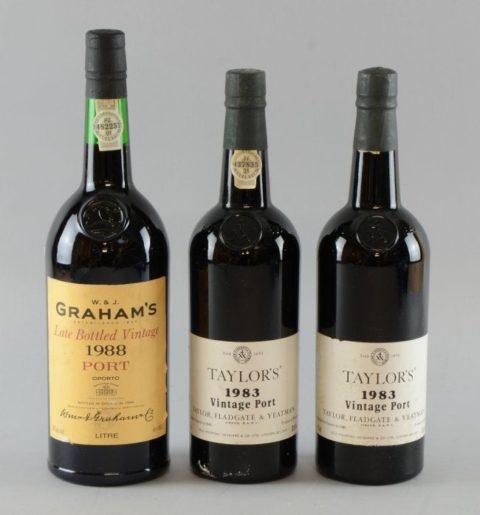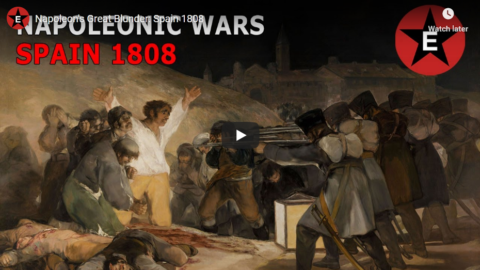Overly Sarcastic Productions
Published 22 Jan 2021So you just conquered Iberia, and you’re wondering where to go from here? It’s a more common conundrum than you might think. Consider: a big wooden floaty house that goes splish-splash in the Atlantic Ocean. Anyway, this is a video about Portuguese and Spanish (erm, Castilian) exploration in the Atlantic during the 1400s. Please note my deliberate decision to Nope on out at the turn of the 1500s.
This topic was requested by our longtime patron Antonio Juarez! Thank you Antonio for supporting our work and helping to provide entertaining educational content.
SOURCES & Further Reading: Ornament of the World by Maria Rosa Menocal; lectures from Great Courses Plus “1571: Spain, Portugal Encircle the Globe” by Donald J. Harreld, “Renaissance and Exploration: New Horizons” by Jennifer McNabb, “Portugal’s Great Leap Forward” by “Vejas Gabriel Liulevicius”
TRACKLIST: “Scheming Weasel (faster version),” “Monkeys Spinning Monkeys”, “Local Forecast – Elevator” Kevin MacLeod (incompetech.com)
Licensed under Creative Commons: By Attribution 4.0 License
http://creativecommons.org/licenses/b…Our content is intended for teenage audiences and up.
PATREON: https://www.Patreon.com/OSP
PODCAST: https://overlysarcasticpodcast.transi…
DISCORD: https://discord.gg/osp
MERCH LINKS: http://rdbl.co/osp
OUR WEBSITE: https://www.OverlySarcasticProductions.com
Find us on Twitter https://www.Twitter.com/OSPYouTube
Find us on Reddit https://www.Reddit.com/r/OSP/
January 23, 2021
History Summarized: Atlantic Exploration
January 8, 2021
QotD: Culinary appropriation
Cultural appropriation is good. When ideas from different cultures are imperfectly absorbed, new ideas ensue. Exchange promotes change. I detest empires, but, in deference to truth, praise them as culturally creative arenas in which new ways of life, thought, art, language, worship, work, government and food take shape, as people swap and circulate biota, behaviour and brilliance.
Some of the resulting dishes are deplorable. I could live happily in a world without chop suey, chilli con carne, or coronation chicken. I’m not going to try a recipe described in Eater magazine as “huevos Kathmandu that paired green chutney and spiced chickpeas with fried eggs”.
Tex-mex cuisine is Montezuma’s most effective revenge. Rijstafel conquered the Netherlands more thoroughly than the Dutch ever subjected the East, and now rivals the drearier Hutspot as Holland’s national dish. Yet Dutch food still lags behind grandes cuisines.
Vindaloo is the epitome of culinary appropriation: a Bengali dish with ingredients from the Americas — potatoes and chillies — and a corruption of a Portuguese name: vinho d’alho, or garlic wine. It has become so British that “Vindaloo nah-nah” was the chorus of a chant popular among English football fans at a World Cup tournament (perhaps they confused it with Waterloo). I still dislike it.
Usually, however, culturally exchanged foods produce admirable dishes. Chocolate, tomato and avocado are among the few English words derived from Nahuatl. The Aztecs never used the items they designate in pain au chocolat, or tricolore, or avocado toast. But the responsible cultural appropriators deserve praise, not blame.
Satay would be unthinkable if Malays hadn’t incorporated peanuts that Portuguese pinched from Brazil. The basics of cajun cuisine reached Louisiana with “Acadian” migrants from French Canada — but cultural appropriation made it what it is today. Black chefs in the same region would be at a loss without African-born yams.
Curries would be historical curiosities if Indians hadn’t appropriated chillies from Mexico. Is Sichuanese cuisine imaginable without American peppers or sweet potatoes. Tempura would be unavailable if Japanese chefs hadn’t annexed and improved Portuguese techniques of frying. Culinary historians bicker over whether Jewish or Italian immigrants developed fish and chips. But almost everyone agrees that the British could never have done it on their own.
Felipe Fernández-Armesto, “Bad taste of PC foodies”, The Critic, 2020-09-19.
December 15, 2020
Port wine
In The Critic, Henry Jeffreys considers how Port became so popular in Britain:
Before there were package holidays, there was port. This was the way British people shivering on their cold wet island could get a bit of sunshine. It’s a miracle drink, preserving the heat of the Douro valley in liquid form for decades ready to be uncorked and spread cheer. And don’t we need cheer more than ever at the moment? According to Adrian Bridge, CEO of Taylor’s, British port sales were booming during lockdown.
Our love affair with port goes back a long way but the funny thing is that when wines from Portugal began to arrive in large quantities in the 17th century, people hated it. Port was a necessity because Bordeaux, the traditional wine of choice, had become expensive due to the high duty put on it from Cromwell’s time onwards. Early port was a rough sort of wine, often transported down to the city of Oporto in pig skins and adulterated with brandy and elderberries. A poem from 1693 by Richard Ames captures the mood of the times: “But fetch us a pint of any sort, Navarre, Galicia, anything but Port.” The Scots in particular were not impressed. After the Act of Union, wine drinking took on political connotations with Jacobites drinking claret and Hanoverians port. This antipathy to port still persists: a few years back, I sat next to a Scottish woman at dinner who complained that the English only drank port to thumb their noses at Napoleon.
It took a long time before port became the sweet smooth consistent wine that we know and love today. In fact, until 1820 it would usually have been dry. The vintage that year was so hot that the grapes contained more sugar than the yeasts could deal with, so brandy was added while the wines were still fermenting. It was such a success in Britain that this became the model for how port was made in future. Not everyone was keen, however. Baron Forrester, the man who first mapped the course of the Douro river, was still complaining about the new-fangled sweet port right into the 1850s. The current winemaker at Taylor’s, David Guimaraens, reckoned this year’s heatwave had more than a little in common with the 1820 vintage.
Port really is perfectly designed to deal with this heat. Even with modern temperature-controlled fermentation it can be difficult making balanced dry wine with such ripe grapes whereas adding brandy during the fermentation preserves the fresh fruit flavour. Furthermore, heavier wines can be blended with lighter vintages to make tawny ports which are aged for years in wood with oxygen contact. Tawnies were traditionally enjoyed more by the Portuguese but they’re becoming increasingly popular over here. They’re mellow, pale and nutty from oxygen contact, quite different to vintage wines. The great thing is they are ready to drink, no ageing or decanting needed, and an open bottle will last for months. In fact, wood-aged ports are practically indestructible, I’ve had examples from 1937 and 1863 that were both fresh and vigorous.
Grapes with the right balance can go into vintage releases, though a declared vintage from 2020 does look unlikely. The discovery of how well port aged in bottles was probably an accident. A well-off individual would buy a pipe of port (around 500 litres) and have it bottled and corked. It was discovered that after years in bottle, something sublime happened to the fiery tannic wine. A vintage from a declared year will need at least 20 years. Happily, for the impatient among us, ready to drink vintage ports aren’t terribly expensive when you compare with the price of say, mature Bordeaux or Burgundy.
November 8, 2020
QotD: Tribal and post-tribal economies
… it was a problem of permitting, by and large. Portugal isn’t as bad, mind, nowhere near but in the seventies a lot of places were designated “green belts” everywhere, so that to build on them (and you had to build on them, or you were stymied in growth) you had to know who to bribe, and of course have the money to do it. This isn’t the only reason why favelas end up housing even the middle class. There’s a ton of other reasons, including but not limited to land ownership and property rights, and a shit-ton of stuff. But permitting is part of it.
This is because people don’t view their public posts as something they do to make society better/serve society or even do a job, but as a way to enrich themselves/benefit their friends/make it easier to make money in the future.
Everything, from truly shoddy workmanship to rushed, corner/cutting work, to outright corruption comes from viewing a job not as something you take pride in and work to do your best at, but from viewing a job as an opportunity to enrich yourself and your family while doing as little work as humanly possible. In fact in some societies, this is viewed as a duty. As someone in comments cited there are places in Africa where locals can’t run a shop, because all their relatives near and distant will expect to be given merchandise for free … or even money out of the till.
A lot of this is because the idea of the individual as independent of the tribe and the family is a very new thing in most of the world. We kind of have a head start on it because we are/are descended from those who left family and tribe behind.
[…]
Also in most of the world working for money is vaguely shameful. Particularly so if you’re working for someone else. […] And even here not only does that attitude persist, but it’s trying to make itself normal. Particularly in politics.
So, take pride in what you do, and do the best job you can. It’s not just important for you, it’s a building block of society. Do the best you can, and control as much as you can, so maybe you will have just reward which is an incentive to do better.
This way is civilization built. This way do things actually improve.
Sarah Hoyt, “BUILD!”, According to Hoyt, 2018-07-25.
August 11, 2020
QotD: Our culture shapes what we can see
One of the things I keep trying to explain to my “woke” colleagues, when they stand tall and righteous and put their shoulders back and say that Heinlein was racisthomophobicsexist or that great authors of the past should have been better than to follow the prejudices of their time, is that when you’re immersed in your time, you don’t see the prejudices and the blind spots.
I have a little more insight into how culture shapes what’s possible to think, because I changed my culture as an adult. While this can be done (obviously) and immigrants should be encouraged to do it, (or go home), the acculturation is never complete. What happens is that you acquire a sort of cultural double vision. Depending on how far your acculturation goes, you’ll see the defects in thought or at least the unquestioned assumptions in one of the countries better, but also have a strong feeling of being outside enough to see some flaws in your dominant culture. In my case, for instance, I see the flaws in Portugal very clearly, like the obsession with speed over diligence or being decisive over being right, but I still see some in the US which is why sometimes I say “what people born and raised here don’t see.”
I have, of course, even more insight, due to being a conservative in the US, in a culture and profession (the arts/publishing) that is not only majority left, but majority extreme left. For many years, the only way to stay at least plausibly under cover was to see what they were seeing, and what they expected.
But without that, most people are blind to the … ah, unconscious or unthinking parts of their culture. Heck, even with what I’ve been through, I still tend to accept a lot of things unconsciously, unless I step back and go “Now wait a minute.”
Sarah Hoyt, “Slouching Into Shackles”, According to Hoyt, 2018-04-27.
August 3, 2020
QotD: History or “Her” story?
In another land, a long, long time ago, I was a student of languages. It was there that I came across the American left’s obsession with corrupting the language.
In my last year in college, I had American Literature taught by a Fullbright exchange professor. I will never forget the moment the poor man — talking to a class of 36, all women as such classes often are — let slip the innocent word “him” to mean an indeterminate gender. He paused, went white, his eyes widened, and he said, “I mean, I mean, he or she.”
Meanwhile, the class of 36 was staring at him in puzzlement. It took us a while to take it all apart and realize he thought we’d be offended by the use of “he” to mean someone generic, of indeterminate gender.
I think we patted him kindly on the shoulder and told him that no, really, we weren’t offended. The usage was the same in Portuguese and we’d been told it was the same in most Indo-European languages. And who on Earth would get offended over semantics? The language was the language. It meant nothing about us personally.
This was of course before I married, came to the U.S. and found that for the American woman circa 1985, the language was not just personal, it was personally offensive.
I remember standing in horror underneath a bookstore section proudly labeled Herstory.
Of course the etymology of the word history is not his + story, the sort of pseudo-clever deduction about language that I was used to from the near-illiterate elderly people in the village. (It would be too complex and involve Portuguese, but there was this old farmer who had somehow deduced from the Portuguese word for farmer that farmers were the only ones who would be saved at the end of time.)
History, of course, is not originally an English word. It comes from the Latin historia — meaning a relation of events — by way of the French estoire, meaning story. Note please that in neither of those languages does “his” mean “belonging to him.” And that making the same sort of illiterate assumptions about the French word, we’d get “It is oire.”
I thought that the store must have hired an illiterate employee, but no, over the next ten years, in various circumstances, and possibly still except for the fact that I’ve learned to silence such fools with a death glare, I’ve come across the same smug-idiot assumption and “corrections” of the English word, so as to “fight against the patriarchy.”
That this is done by people who paid more money than I make in a couple of years for a college degree, and who, doubtlessly, think that etymology is a dish made with onions, or perhaps a conspiracy of the patriarchy fills me with a sort of dull rage that has no outlet.
Sarah Hoyt, “The Semantic Whoredom of the Left”, PJ Media, 2018-05-11.
July 15, 2020
When The Dutch Ruled The World: Rise and Fall of the Dutch East India Company
Business Casual
Published 14 Sep 2018Thanks to Cheddar for sponsoring this episode! Check out their video on the iconic ad campaign that saved Old Spice here: https://chdr.tv/youtu8b4a6
⭑ Subscribe to Business Casual → http://gobc.tv/sub
⭑ Enjoyed the vid? Hit the like button!Follow us on:
► Twitter → http://gobc.tv/twtr
► Instagram → https://gobc.tv/ig
► LinkedIn → https://gobc.tv/linkedin
► Reddit → https://gobc.tv/reddit
► Medium → https://gobc.tv/medium
June 24, 2020
Napoleon’s Great Blunder: Spain 1808
Epic History TV
Published 16 Jan 2019In 1808, Napoleon’s rivalry with Britain led to an ill-fated intervention in Portugal and Spain, that sparked a nationalist revolt against the French. At Bailén Napoleon’s Empire suffered its first major defeat, and though Napoleon himself then arrived in Spain to reassert French military dominance, he could not prevent the escape of Sir John Moore’s small British army, after its defensive victory at Corunna on 16 January 1809. The British army would return, under new leadership, to play a major part in his downfall.
Get early access and a vote on future topics by supporting us on Patreon: https://www.patreon.com/epichistorytv
With thanks to HistoryMarche, check out his channel here: https://www.youtube.com/channel/UC8MX…
Find Osprey books on the Napoleonic Wars here:
https://ospreypublishing.com/Great books about the Napoleonic Wars (as an Amazon Associate I earn from qualifying purchases):
The Napoleonic Wars http://geni.us/R5ZI9c
Corunna 1809 http://geni.us/IHLD
Peninsular War Atlas http://geni.us/S6Na84z
Napoleon the Great http://geni.us/NqMW#EpicHistoryTV #NapoleonicWars #Napoleon
All music from Filmstro https://www.filmstro.com/
Get 20% off an annual license with this exclusive code:EPICHISTORYTV_ANNThanks to The 95th Rifles Battle Re-enactment and Living History Society: https://www.95thrifles.com/
May 1, 2020
Why Pearl Harbor? Peaceful Portugal, and the poor Kriegsmarine – WW2 – OOTF 011
World War Two
Published 30 Apr 2020How were relations between Japan and the United States at the beginning of the war? What were both sides doing to try and make Portugal enter the war? And to what extent did the Kriegsmarine match the Royal Navy? Find out as we answer these questions in this Out of the Foxholes episode!
Links to the Between 2 Wars videos mentioned in the episode:
Japan, the Bureaucratic War Machine | BETWEEN 2 WARS I 1931 Part 2 of 3: https://youtu.be/vVgCy6iwrHQ
The World Takes Advantage of American Isolationism | BETWEEN 2 WARS | 1933 part 3 of 3: https://youtu.be/-iuQcxXAdfw
Did WW2 Start in 1937? – The Rape of China | BETWEEN 2 WARS I 1937 Part 1 of 2: https://youtu.be/_3vPGpamtDIJoin us on Patreon: https://www.patreon.com/TimeGhostHistory
Or join The TimeGhost Army directly at https://timeghost.tvFollow WW2 day by day on Instagram @World_war_two_realtime https://www.instagram.com/world_war_t…
Between 2 Wars: https://www.youtube.com/playlist?list…
Source list: http://bit.ly/WW2sourcesHosted by: Indy Neidell
Written by: Rune Væver Hartvig
Director: Astrid Deinhard
Producers: Astrid Deinhard and Spartacus Olsson
Executive Producers: Astrid Deinhard, Indy Neidell, Spartacus Olsson, Bodo Rittenauer
Creative Producer: Joram Appel
Post-Production Director: Wieke Kapteijns
Research by: Rune Væver Hartvig
Edited by: Mikołaj Cackowski
Sound design: Marek Kamiński
Map animations: Eastory (https://www.youtube.com/c/eastory)Colorizations by:
Carlos Ortega Pereira, BlauColorizations, https://www.instagram.com/blaucoloriz…
Dememorabilia – https://www.instagram.com/dememorabilia/Sources:
BIBLIOTECA DE ARTE DA FUNDAÇÃO CALOUSTE GULBENKIAN
BundesarchivSoundtracks from the Epidemic Sound:
Reynard Seidel – “Deflection”
Fabien Tell – “Last Point of Safe Return”
Johannes Bornlof – “Deviation In Time”Archive by Screenocean/Reuters https://www.screenocean.com.
A TimeGhost chronological documentary produced by OnLion Entertainment GmbH.
April 7, 2020
Cultural factors in the spread of the Wuhan Coronavirus
Sarah Hoyt explains why any computer model involving actual human beings might as well begin with “Assume a Spherical Cow of Uniform Density in a Frictionless Vacuum“:
What I do know is that — are you ready? — human societies, involving multiple nations or even our own culturally diverse, geographically spread out nation, are not now nor will they ever be a spherical cow of uniform density in friction-less vacuum.
So … why is it that even now that they admit the scary Imperial model is insane, our authorities, from federal on down are treating the US as though it were just that mythical cow, and on top of that exactly the same as the cow in Italy, Spain or France.
[…] but here’s the thing: Italy has a completely different culture. Yes, it also has a sclerotic, understaffed and just impoverished healthcare system. (Yes, every time I post that I have to spam a million comments telling me how well the WHO ranked Italy — which is great, except the WHO ranks a single payer system above everything else, including outcomes — and how Lombardy is the envy of Italy or something, which leads me to say “Sucks to be you.”)
However, that’s just a factor in the debacle. The other factor is culture and no one is taking it into account. Multi-generational families live together (I should throw stones, yes) or in the same house which becomes a sort of compound. (This is common to all Mediterranean cultures. I grew up in such a compound until the age of six.) which means that while Grandma isn’t abandoned to the tender mercies of Haitian health workers, it’s also really hard to isolate her when little Guido gets the never-get-well at school and cheerfully brings it home. Even when they don’t live together, extended families have a level of closeness that freaks out even the closest American families. If you and your relatives live within driving distance of each other and don’t see each other every other day, there’s something wrong.
Every house is a continuous cacophony of visiting relatives and friends. In safer times, we just left the back door unlocked because it was easier than answering the doorbell every five minutes. When I first got married, I had the TV on all day, because otherwise the house was so silent, it freaked me out. (I left Disney channel on all day, because it was less likely to startle me with explosions or evil laughter. This led my inlaws to believe I only understood “English for children” (rolls eyes.) I wasn’t even in the room with it. I just needed that noise, or I freaked out, because of the habit of a lifetime.
The freakiest thing in my exchange student years was that my family never had people drop by, several times a week, just because.
On top of that, of course, a lot of the younger people live in stack-a-prole apartments with shared air, and most people commute by train or bus or something.
Now, in Portugal at least most trains and buses aren’t as full as they were in my youth. You are rarely packed in like sardines. But it’s still public transport, and at rush hour every seat is taken and there are people standing.
As much as I get sick here, I got sick way more often there, and had a few really close calls, starting at about thirteen. Because you live in each other’s pockets.
And I understand that in Italy, as in Portugal, as in, for instance, France, people kiss a lot more. Adult men might not, unless they’re close(ish) relatives, but women and children get kissed by everyone from close kin to total strangers.
All of those create conditions for the virus to explode. In Italy, in France, in Spain. I understand it’s not exploded nearly as much in Portugal, but I also wonder how much of that is Portuguese reluctance to go to the doctor or the hospital. Because “the hospital is where you die.” (Yes, sue me. Some cultural assumptions remain. Which is why my husband is the one who normally drags me to the hospital.) Because, you see, we DO know for at least one of the clusters, the hospital was making it worse. Go to the hospital for any other reason, catch Winnie the Flu.
March 19, 2020
Second Crusade | 3 Minute History
February 6, 2020
The rise of the Saadi Empire of Morocco
In the latest Age of Invention newsletter, Anton Howes outlines the rise of a Morocco-based Islamic empire that beat the Portuguese and established a thriving smuggling network with England:
In 1500 you would have thought that Morocco’s golden ages were firmly in the past. The Portuguese in 1415 had conquered Ceuta, on the southern side of the Straits of Gibraltar, with minimal resistance. Over the next century they had then spread their influence across the Moroccan coastline, building forts, establishing small trading colonies, and interfering in local politics. Faced with constant raids, coastal towns like Safi, Massa, and Azammur submitted themselves to Portuguese vassalage in exchange for protection. And when local rulers failed to please them, the Portuguese installed new ones or even took direct control. A disunited Morocco was at the mercy of Portuguese colonial ambition — a source of grain destined for Portugal’s population, and of horses and patterned cloths for it to exchange in sub-Saharan Africa for gold and slaves.
In the 1510s, however, a new dynasty arose in Sus, in the south-west of the country, claiming direct descent from the Prophet Muhammad. These sharifs, the Saadi dynasty, began to fill the vacuum left by ineffective leadership from the sultans in Fez and Marrakech. And to address the massive power imbalance between themselves and the Portuguese, they began to cultivate sugar, selling it to other Europeans — Spanish, French, Genoese, Dutch, and English — in exchange for gunpowder weapons.
The English were especially expert smugglers, frequently able to sneak past the Portuguese fleets to where they could trade directly with the Saadis. Merchants from the Hanseatic league even approached the English government about using English mariners to get iron shot to Morocco. Their request was denied — Elizabeth I and her ministers were always careful never to explicitly allow the munitions trade, even in private letters, and often publicly disavowed it — but it was common knowledge among London’s merchants that the government supported the smuggling. This was partly about having a supply of sugar independent of Portuguese and Spanish control, but it was also a matter of national security. Because hidden among the sugar, marmalade, candied fruits, and almonds that the English transported from Morocco, were also copper and saltpetre — crucial materials for England’s own gunpowder weapons (I still haven’t quite worked out why England needed to import copper, given it had its own deposits in Cornwall, but it seems to have been important and a secure supply of saltpetre was definitely essential).
Both sides benefited from the arrangement. By the mid-1540s, the Saadis had bought the firearms and artillery necessary to take Marrakech and Fez, effectively unifying the country, and had earned sufficient wealth to buy the allegiance of the Moroccan population, providing grain during periods of intense famine. With that allegiance, they began isolating the Portuguese forts along the coastline, denying them access to food, workers, and trade. From the perspective of the Portuguese crown, the forts thus lost their economic value, while becoming increasingly expensive to maintain. Rather than providing Portugal with Moroccan grain, the forts increasingly needed grain from Portugal. With the added pressure of Saadi sieges, now aided by massive artillery, Portugal began to lose their footholds, abandoning many of the rest. Thus, in the space of a few decades, the export of sugar (and saltpetre) by the Saadis had put the mighty Portuguese empire on the back foot.
January 30, 2020
QotD: Nutrition and aging from the middle ages to the 20th century
Those of us who didn’t grow up in the first world (second and a half at best!) know d*mn well how people lived in the 20th century, with nominal indoor plumbing, but without a lot of changes of clothing, washers and dryers, heated houses, etc. (The trains from the mountains, where it was colder, in winter, smelled like a mix of VERY unwashed bodies and wood smoke. You never forget that smell.) The particular etc. I have in mind in this case is the lack of refrigeration.
Look Portugal is fertile enough that a careful planner can feed a family on less than an acre of land (particularly the area I come from, apparently one of the oldest inhabited in Europe and whose name in Indo European translated as wet and fertile valley.) I’m sure the food available to us in the 20th century when you could buy improved seeds, etc. was way better than the one available to people in the middle ages.
But … yeah, no. We didn’t eat like people do now. Not even close. For one, meat was fairly scarce. We mostly ate fish (thanks to the coasts!) and vegetables. Oh, and we were relatively lucky. A lot of people got almost no protein. The most common lunch among the people was the “isca” that is a bit of fried flour which might or might not have a couple of shreds of codfish in it. The very poor ate a lot of vegetable soup.
And again this was in the 20th century. In winter vegetables more or less vanished and the only fruit available were the wrinkled, flour-like apples.
Christmas treats were dried fruit, not cookies. It tells you all you need to know. (Yes, it was healthy too except for the scarce protein for most people, but no one said the way we eat is particularly healthy.)
I’m not complaining, but I know that we ate massively better than my parents did in the mid 20th century. And they ate better than their parents. So, kindly, do not tell me some serf on a medieval estate got his choice of however many flavors of ice-cream.
Sure the very rich ate well, if sometimes oddly. But the average person, not so much.
And as for living as long? Yeah, no.
I still remember vividly — as do many our age — when 60 was old, 70 VERY old.
Yes, I’m concerned for my parents in their late eighties. And that’s, as my dad puts it “after 80, that’s old”. But it would surprise no one is they lived another 10 years. Because a lot of people do now. And now one makes a big deal of people who turn 100. (Even though 114 seems to be, a little inexplicably, our hard drop-off limit.)
And besides we KNOW. Shakespeare at 58 — two years older than I’m now — was “very old.”
So kindly take your “people lived about as long,” fold it all in corners and put it where the sun don’t shine, even if people in the arctic in winter will be a little puzzled by it.
Sarah Hoyt, “What if I Told You?”, According to Hoyt, 2019-11-05.
January 18, 2020
Tank Chats #59 Sherman Grizzly | The Tank Museum
The Tank Museum
Published 16 Nov 2018David Willey, Tank Museum Curator, presents a Tank Chat on the Sherman Grizzly.
This version of the Sherman was built in Canada from October 1943. After the fall of France, the Canadians began making their own vehicles, beginning with the Ram tank based on the M3 Lee chassis before moving on to a modified M4 Sherman. Only about 180 were produced.
This vehicle is currently on loan to the Heeresgeschichtliches Museum Wien.
Support the work of The Tank Museum on Patreon: ► https://www.patreon.com/tankmuseum
Visit The Tank Museum SHOP: ► https://tankmuseumshop.org/
Twitter: ► https://twitter.com/TankMuseum
Tiger Tank Blog: ► http://blog.tiger-tank.com/
Tank 100 First World War Centenary Blog: ► http://tank100.com/ #tankmuseum #tanks #tankchats
November 21, 2019
QotD: Honour
Lately I’ve been thinking about honor. Maybe because I spent the last couple of months mulling over the musketeers. Maybe because I’ve gone back to a regency-reading jag as I work on things as far from regency as possible.
Honor has got a bad rep lately. It’s been dragged through the mud, and its garments are draggled. Association of its names with such egregious ideas as “honor killings” has done it no good.
It’s particularly unjust since honor killings are more shame-killings. I grew up in a culture that still shows a lot of Arab influence, (well, they were there almost as long as the Romans, you know?) and I almost understand honor killings – if I squint and look sideways. I was, after all, raised in a village (so like Miss Marple I’ve seen all there is to see of human wickedness.) Of course Portuguese – at least civilized ones – don’t honor-kill their daughters. But we had a case in the village where a father shaved his daughter’s head because she was talking to a strange boy. And even with my family’s rather odd behavior, since we were all readers and a fair number of us engaged in creative work, I came across that “how could you talk to him when you were alone in the house? What will people think? You have shamed us all.” I came across it more than once, because I have trouble wrapping my mind across the nonsensical. And to me – particularly when this started, when I was about eight – seeing a little friend who happened to be a boy was no different from seeing a little friend who happened to be a girl.
But the overwrought minds of village spinsters and old women looked at this the way “enlightened” militant “feminists” do. Like the one who accused my nine year old of sexual harassment for touching a girl’s behind while trying to get her attention. (He didn’t fondle her. He reached through a crowd and poked her, to ask if she wanted to play a space exploration game.) If you’re a male you have lust and evil on your mind, and any woman allowing you near has lost her virtue. (They must live MUCH more interesting lives than I do.)
Anyway, honor viewed that way is more what the public thinks of you and what you allow the public to know. You can lose your honor through all sorts of stupid things that have nothing to do with what is in your heart and mind. You can be “disgraced” the way a regency maiden was disgraced because she tripped in public and fell across a gentleman, and didn’t immediately faint or whatever. (Well, at least in regency romances. I believe true society had more leniency. I mean, even in the village, even with my eccentric behavior and the fact I wore shorts outside the house – oh, the humanity! – only half the people considered me a slut.)
Sarah Hoyt, “An Affair of Honor a blast from the past from April 24 2012”, According to Hoyt, 2017-10-11.












